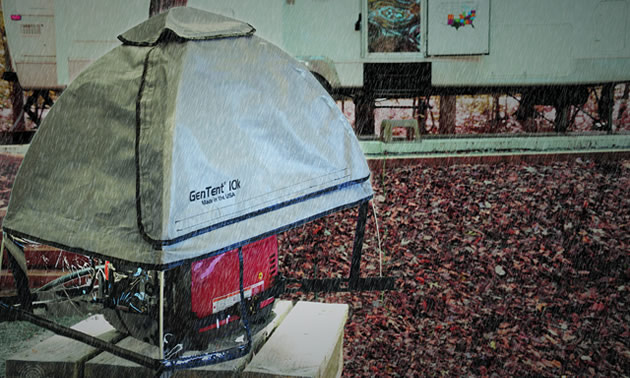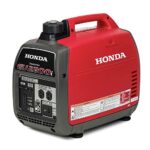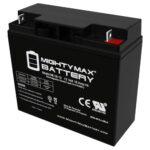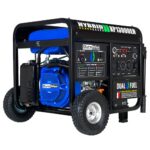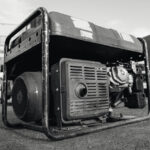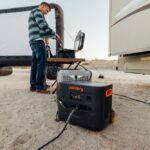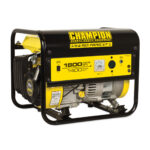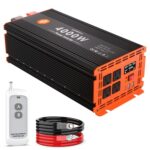No, a generator should not get wet. Water can damage it.
It can also pose a safety risk. Generators are essential during power outages, but they need proper care. One common question is whether they can get wet. The short answer is no. Water can cause electrical malfunctions and increase the risk of electrocution.
When a generator gets wet, it can short-circuit, leading to expensive repairs or complete failure. Moreover, using a wet generator can be dangerous for you and those around you. Ensuring your generator stays dry will help it run efficiently and safely. So, let’s explore the reasons behind keeping your generator dry and the best ways to protect it from moisture.
Introduction To Generator Safety
Generators are useful. They provide power in emergencies. But using them safely is very important. Proper usage can save lives. It can also prevent damage. Always read the manual before use. Follow all the instructions carefully. Make sure you know how to operate it.
Generators can be dangerous. Water and electricity do not mix. Keep your generator dry. Wet generators can cause shocks. Carbon monoxide is another concern. Never use a generator indoors. Keep it outside, far from windows. Fuel storage is also important. Store fuel safely. Follow all safety guidelines.
Effects Of Water On Generators
Water and electricity do not mix well. Wet generators can cause short circuits. Sparks can fly. Fire hazards increase significantly. There is a risk of electric shock. This can be dangerous to users. Keep generators dry. Avoid using them in the rain.
Water can cause rust on metal parts. This can weaken the structure. Wet conditions can damage the engine. Internal parts may get corroded. This can lead to performance issues. Generators might fail to start. Regular maintenance is needed. Always store them in a dry place.
Risks Of Operating A Wet Generator
Short Circuits can happen if a generator gets wet. Water can cause wires to touch and create a short. This can damage the generator. It can also hurt the person using it. Safety is very important. Always keep the generator dry.
Fire Hazards are another risk. Wet generators can spark a fire. Water and electricity do not mix well. Fires can start quickly. They can spread fast. It is best to keep generators away from water. This helps prevent fires and keeps everyone safe.

Credit: www.angi.com
Preventing Water Exposure
Generators must be kept dry. Water can damage them. Find a safe spot for storage. Avoid areas prone to flooding. Use a shed or garage. These spots protect from rain.
Use weather-proof covers for extra protection. Covers keep water away. They fit snugly over generators. Make sure they cover all parts. Check covers for holes. Replace damaged covers right away.
Emergency Situations
A generator can become wet in a storm. Water and electricity together are dangerous. First, turn off the generator. Unplug all devices. Move the generator to a dry place.
- Dry the generator with a towel.
- Check for any damage.
- Inspect the outlets and cords.
- Do not start the generator until it’s fully dry.
- Consider calling a professional for a check-up.
Safety first. Never use a wet generator. Always keep it in a dry place.
Maintenance Tips For Wet Conditions
Check the generator often. Look for any signs of water damage. Make sure all parts are dry. Inspect the wires and connections. Water can cause rust and other problems. Replace any damaged parts right away. Keep the generator in good shape for safety.
Turn off the generator first. Unplug all devices. Wipe down the generator with a dry cloth. Use a hairdryer if needed. Avoid using water to clean it. Keep the generator dry at all times. Store it in a dry place. Make sure it’s ready for the next use.
Choosing The Right Generator
Generators can be at risk in wet conditions. Water-resistant features help protect the machine. Look for generators with sealed outlets. This keeps water out. Some models have a waterproof cover. It shields the engine. Rust-resistant parts are important too. They last longer in wet weather.
Brands And Models
Some brands are better in wet conditions. Honda generators are known for durability. Yamaha offers models with sealed parts. Generac has water-resistant options. Check the features before buying. Choose a brand that fits your needs.
Conclusion And Safety Reminders
A generator should not get wet. Water can damage the machine. Wet generators may cause electric shock. Always use a cover during rain. Store the generator in a dry place. Make sure the area is well-ventilated.
Keep children away from the generator. Do not operate with wet hands. Place the generator on a level surface. Turn off the generator before refueling. Check for damaged parts regularly. Follow the manufacturer’s instructions.
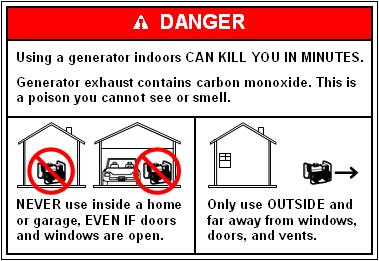
Credit: www.gentent.com
Frequently Asked Questions
Can You Run A Generator In The Rain?
Running a generator in the rain is unsafe. Water can damage the generator, causing it to malfunction. Always keep it dry.
What Happens If A Generator Gets Wet?
If a generator gets wet, it can short circuit. This may cause electrical shock or damage to the generator.
How Do You Protect A Generator From Rain?
To protect a generator from rain, use a generator tent or a cover. Ensure it’s well-ventilated.
Is It Safe To Use A Wet Generator?
Using a wet generator is unsafe. It can cause electrical hazards or damage the generator. Always dry it first.
Conclusion
Keeping your generator dry is crucial for safety and performance. Water can damage its components. Always use it in a dry, covered area. Protect it from rain and snow. Regularly check for moisture. Use waterproof covers if needed. A little care goes a long way.
Ensure your generator runs smoothly and lasts longer. Stay safe and maintain your equipment properly.

